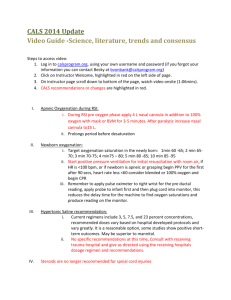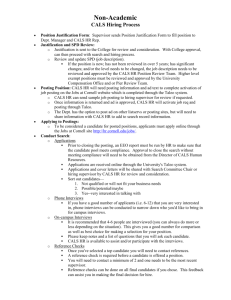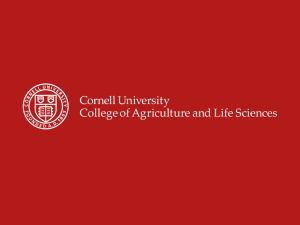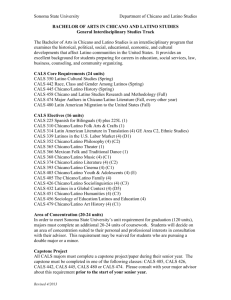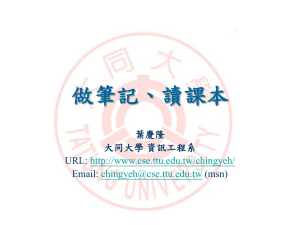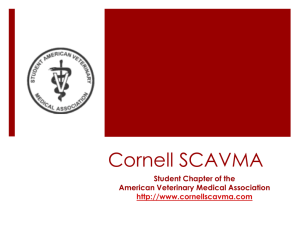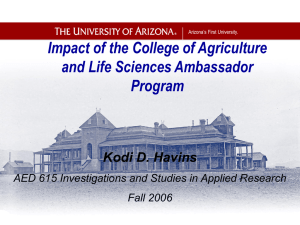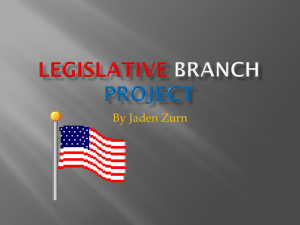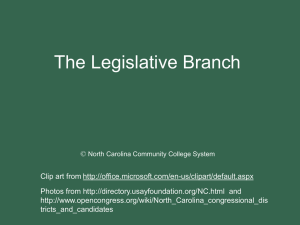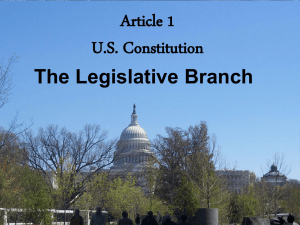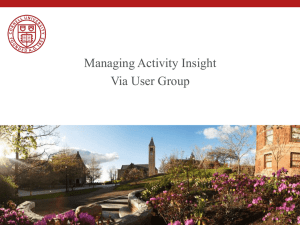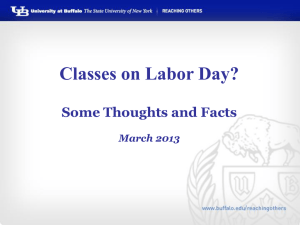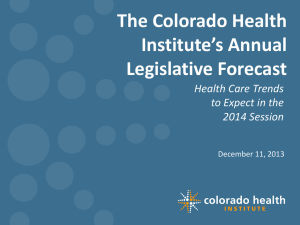CALS Faculty Senate: State of the College
advertisement
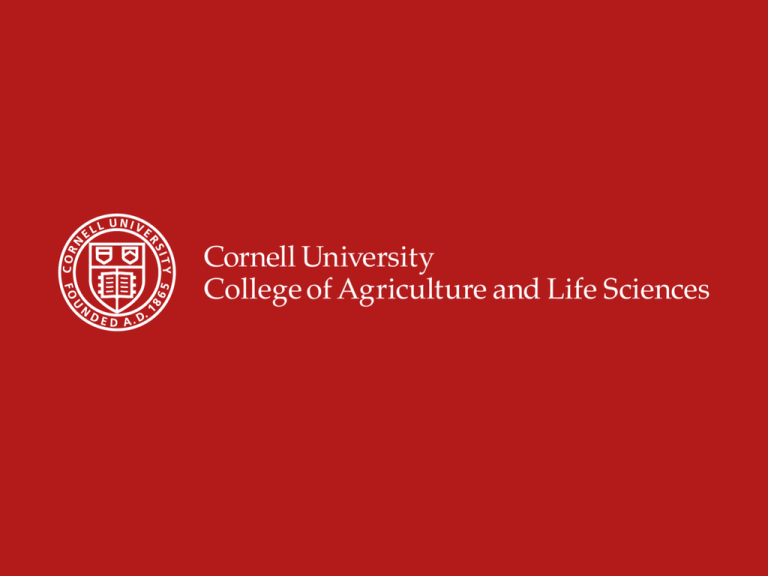
CALS Faculty Senate: State of the College May 1, 2013 Welcome! Kathryn J. Boor, Ph.D. The Ronald P. Lynch Dean of the College of Agriculture and Life Sciences State Budget Under the Microscope • SUNY operating funds to Cornell continue at last year’s level • No SUNY 5-year capital plan or critical maintenance funds in FY14 • CALS programs held steady or slightly increased; Community IPM & FarmNet each received $100K increases • $19M increase to Environmental Protection Fund may help several CALS programs • $40K hops appropriation to Geneva; Contracts signed for $4.7M Geneva greenhouse renovation • Partner ag industry groups receive increases • CCE & Harvest NY funding is flat for FY14 CALS in the Rankings • Bloomberg Businessweek ranked the Undergraduate Business Program in the Dyson School 3rd in the nation for the second year in a row • Program also named 4th in Entrepreneurship and 5th in Finance • U.S. News and World Report ranked Cornell 3rd in the nation for graduate Agricultural/Biological Engineering & 11th for Environmental Engineering, a move upwards of one position over last year Environmental Science & Sustainability Major • ESS Major derived from merger of three former environmental majors – Natural Resources, the Science of Natural & Environmental Systems (SNES) & Environmental Explorations • Curriculum emphasizes social dimensions of sustainability by integrating social sciences with physical, chemical, & biological sciences • 35 faculty from across 15 departments to teach courses in ESS major • 100+ additional applications to new major over combined total of previous three Goals of the Special Committee for Plant Sciences • Coordination of strategic planning & faculty hiring • Sustaining & enhancing research excellence in the plant sciences • Development of curriculum & student support services to increase number of undergraduate students in the Plant Science major • Better coordination of graduate student support across plant science fields • Enhanced alignment of extension activities with research strengths • Coordination of administrative support services among plant science units Good News: Admissions • 19% rise in freshman applications this year over last • 24% increase in out-of-state & 23% rise in international applications • Class of ’17 the most diverse in CALS history, with a 22% rise in applications from students selfidentified from an underrepresented minority group • The popularity of our new majors suggests strategic changes to our curriculum are resonating with students & their growing interest in agriculture, food security, sustainability, & the environment Question #1a: How Are F&A Revenues Used? Faculty Senate Question: How are F&A revenues used, and how are rates determined? What is the broad context in this arena? Response: • Facilities & Administrative (F&A) revenues pay for the fundamental infrastructure needed to support research in CALS & at the University • F&A revenues fund mission-critical needs such as building & equipment depreciation, debt financing, operations & maintenance, library support, general & sponsored project admin., office supplies, & student services • In FY 13, CALS F&A expenses total approx. $86 million, on F&A revenues of $15 million, leaving $71 million to be paid from other college resources • F&A expenses include legacy debt-financing on Corson-Mudd, and more recent debt for faculty & animal care facilities in Weill & ECRF Question #1b: How Are F&A Rates Determined? Faculty Senate Question: How are F&A revenues used, and how are rates determined? What is the broad context in this arena? Response: • F&A rates are set by the Department of Health & Human Services (HHS) based on data from Cornell on the costs of doing research at the University • HHS-determined rate of 54% applies to most federal contracts • USDA contracts capped at 42% due to specific federal legislation • Third tier of rates, such as w/ state contracts, are subsidized by CALS & can be as low as 18% for mission-critical projects • Cornell charges CALS a minimum of 20% on all research expenditures, therefore CALS subsidizes from tuition and other college resources the 2% difference as well as the remaining F&A costs to the college Question #1c: Fringe/F&A on Product Testing? Faculty Senate Question: Is CALS concerned about the future demise of product testing in support of NY farmers, due to high F&A and fringe charges on the testing income? Response: • CALS cannot subsidize product testing at the expense of other pressing needs; private industry needs to pay for services that enhance their profits on products marketed in NY • In FY 13, the University changed fringe policy to allow temporary employees to be hired on endowed lines at reduced fringe rates: 10% for hires of less than six months; 36% for hires of more than six months • CALS & Cornell exploring allowing regular technical staff to switch to endowed lines. However, any such switch would be permanent for the employee Question #2: Audit/Compliance Requirements Faculty Senate Question: The burden for faculty to comply with audit-threat-driven financial management has become impossible. What changes at BSC can be made to address this? Response: • BSC instituting a Lean Process Improvement initiative to review policies & procedures with the aim of enhancing efficiency & customer service • The University is under increased federal scrutiny on its handling of sponsored research funds; many research institutions, including Cornell, cited & fined for discrepancies in grant management & record keeping • DFA & the University auditors have adopted a conservative approach to risk. Increased regulation & greater enforcement of the rules has led to frustration & confusion for both faculty and staff “eShop Today & eShop Tomorrow” Video http://www.youtube.com/watch?v=2OgviUmj4bQ&feature=youtu.be Question #2a: Faculty Approval on All Purchases? Faculty Senate Question: Why do faculty have to approve every purchase made with grant money, even when it is used to support the research program funded by the grant? Response: • We are not aware of any such CALS or University requirement • If faculty are being told this, it is either the result of a departmental requirement or a misunderstanding of the rules • If you have any further questions on this issue, please speak with your department business officer, Marge Ferguson or Jeanine Masse in the BSC Question #2b: Faculty Signatures on all Invoices? Faculty Senate Question: Why do faculty have to sign every invoice that comes from each of the often many subcontractors that we have on large projects? Response: • This a new requirement instituted within the last year that resulted from an internal Cornell audit • The policy has not been consistently enforced across Cornell; however, it has been in some units • The University is considering a change to the policy to apply only to highrisk transactions, such as foreign subcontractors or subcontractors previously identified as high-risk for credit or other reasons • CALS will continue to press for this change Question #2c: Concerns w/ Listing Business Purposes Faculty Senate Question: What can be done to make the process surrounding the listing & justifying of a business purpose for purchases less onerous? Response: • Due to increased federal scrutiny, DFA & the University auditors are enforcing a strict & narrow interpretation of the rules surrounding the listing & justification of a valid business purpose on purchases • To ensure speedier processing, be sure to include both the project name and the account number on every submitted receipt or purchase order • For reagents, provide multiple account numbers and projects on the receipt if the materials will be used for more than one project • However, items generally considered office supplies (lab notebooks, labels, paper towels, etc.) will not be approved unless explicitly justified in the grant Question #2d: Product Testing Agreements Faculty Senate Question: Why has the process for product testing agreements become more difficult, requiring the signatures of three different people in three different locations? Response: • Current policy dates to 2006, when it was determined that product testing revenues were often being placed in private faculty gift accounts to avoid paying F&A and fringe, a serious violation of Cornell & state benefit rules • A recent audit showed that in some instances, such monies were still being managed incorrectly • Departments are responsible for the proper record keeping & financial management of their faculty’s product testing agreements & revenues • These agreements are sponsored research; the current policy is less burdensome than the alternative, which is full OSP review Question #3: CIT Changes to Web Hosting Faculty Senate Question: What are the changes CIT is making to web hosting services, and how does CALS plan to assist with the transition? Response: • CIT has informed faculty and staff who administer departmental, lab or programmatic websites of a University-wide server transition that may result in new monthly charges for web hosting • CIT is attempting to commoditize web hosting, as part of their new cost recovery model. Many new hosting options are free; others may be billable • Contact your local IT support staff or Dan Hazlitt, CALS Assistant Director of IT, to discuss potential options for the websites you manage • At this time the college has no plans to provide funding to support the transition of unit, faculty or programmatic sites to paid monthly hosting Question #4: University Budget Model Faculty Senate Question: What are the current views on the Provost’s new budget model? How will these changes impact CALS? Response: • Costs apportioned to the unit where they originate & revenue distributed via a metric-derived model, consistently & equitably across Cornell • University General Purpose budget eliminated; Provost initiatives to be funded by “taxing” unit revenue • Ultimate goal: “One Cornell,” where no college is disadvantaged by the budget model • Provost has promised to “hold harmless” units in deficit this year. However, rising financial aid & SIP costs will compel CALS to explore new ways to free additional college resources to invest in faculty hiring Question #5: CALS Programmatic Priorities Faculty Senate Question: How does the CALS leadership go about identifying new programmatic priorities across the college? Response: • We have executed against priorities laid out in college strategic plan, developed in 2009: http://cals.cornell.edu/about/priorities/ • We developed the Knowledge with a Public Purpose mission statement with iterative input from the CALS community that articulates our four core priority areas as a college. These inform investments & strategic decisions • We evaluate departmental annual reports for emerging needs & trends, especially as they intersect with the four core priorities areas • We evaluate & address opportunities as the arise, emphasizing those that align with one or more of the four core priorities CALS Core Priorities & the Land Grant Mission Knowledge with a public purpose Food & Energy Systems Environmental Sciences Sustainability Economic & Community Vitality Life Sciences Questions?
